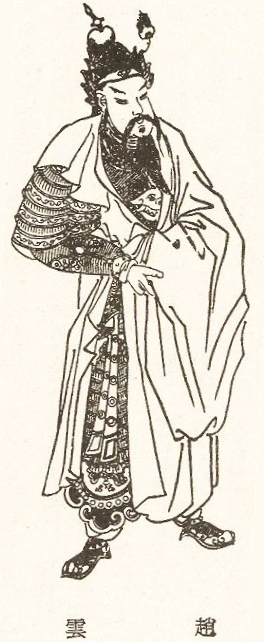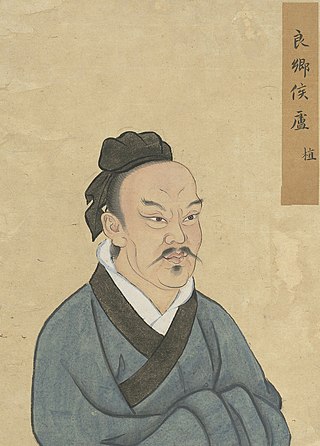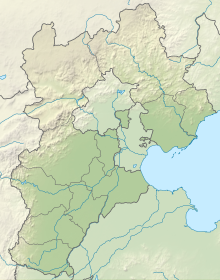
Zhao Yun,courtesy name Zilong (子龍),was a military general who lived during the late Eastern Han dynasty and early Three Kingdoms period of China. Originally a subordinate of the northern warlord Gongsun Zan,Zhao Yun later came to serve another warlord,Liu Bei,and had since accompanied him on most of his military exploits,from the Battle of Changban (208) to the Hanzhong Campaign (217–219). He continued serving in the state of Shu Han –founded by Liu Bei in 221 –in the Three Kingdoms period and participated in the first of the Northern Expeditions until his death in 229. While many facts about Zhao Yun's life remain unclear due to limited information in historical sources,some aspects and activities in his life have been dramatised or exaggerated in folklore and fiction. In the 14th-century historical novel Romance of the Three Kingdoms,he was lauded as a member of the Five Tiger Generals under Liu Bei.

Zhang He,courtesy name Junyi,was a military general serving under the warlord Cao Cao in the late Eastern Han dynasty of China. He continued serving in the state of Cao Wei under its first two rulers,Cao Pi and Cao Rui,during the Three Kingdoms period until his death.

LüBu,courtesy name Fengxian,was a Chinese military general,politician,and warlord who lived during the late Eastern Han dynasty of Imperial China. Originally a subordinate of a minor warlord Ding Yuan,he betrayed and murdered Ding Yuan and defected to Dong Zhuo,the warlord who controlled the Han central government in the early 190s. In 192,he turned against Dong Zhuo and killed him after being instigated by Wang Yun and Shisun Rui,but was later defeated and driven away by Dong Zhuo's followers.

Yuan Shao,courtesy name Benchu (本初),was a Chinese military general,politician,and warlord who lived in the late Eastern Han dynasty. He occupied the northern territories of China during the civil wars that occurred towards the end of the Han dynasty. He was also an elder half-brother of Yuan Shu,a warlord who controlled the Huai River region,though the two were not on good terms with each other.

Yuan Shu,courtesy name Gonglu,was a Chinese military general,politician,and warlord who lived during the late Eastern Han dynasty. He rose to prominence following the collapse of the Han central government in 189. He declared himself Emperor of China in 197 under the short-lived Zhong dynasty,two years before his death in 199.

Gongsun Zan,courtesy name Bogui,was a Chinese military general,politician,and warlord who lived during the late Eastern Han dynasty.

Lu Zhi,courtesy name Zigan,was a Chinese historian,military general,philosopher,and politician during the Eastern Han dynasty. According to the Records of the Three Kingdoms,he was the mentor of Liu Bei and Gongsun Zan. He was described as a tall man with a sonorous voice.

Tian Feng,courtesy name Yuanhao,was a Chinese politician serving under the warlord Yuan Shao during the late Eastern Han dynasty.
Han Fu,courtesy name Wenjie,was a Chinese military general,politician,and warlord who lived during the late Eastern Han dynasty. He was the governor of Ji Province when the Yellow Turban Rebellion broke out in 184.
Qiao Mao,courtesy name Yuanwei,was an official and minor warlord who lived during the late Eastern Han dynasty of China. In 190,he joined a coalition of warlords who launched a campaign against Dong Zhuo,a tyrannical warlord who controlled the Han central government and held Emperor Xian hostage. Later that year,he was killed after getting into a dispute with Liu Dai,one of the other warlords.
Xun Chen (fl.190-200),courtesy name Youruo,was an official who lived during the late Eastern Han dynasty of China. Born in the influential Xun family of Yingchuan Commandery,he was the fourth brother of Xun Yu and a second cousins once removed of Xun You. He initially served as an adviser to the warlord Han Fu and later to another warlord,Yuan Shao.
Cao Bao was a military officer serving under Tao Qian,the Governor of Xu Province,during the late Eastern Han dynasty of China. He became a subordinate of Tao Qian's successor,Liu Bei,after Tao's death in 194. He was killed by Zhang Fei in 196 after a quarrel.
Tian Kai was an official serving under the warlord Gongsun Zan during the late Eastern Han dynasty of China.
The Battle of Yijing was a military conflict which took place in northern China from 198 to 199 in the late Eastern Han dynasty. It was fought between Gongsun Zan,a warlord known as the "White Horse General",and Yuan Shao,a scion of the esteemed Yuan clan and former leader of the coalition against Dong Zhuo.
Xin Ping,courtesy name Zhongzhi,was a Chinese official who served under the warlords Han Fu,Yuan Shao and Yuan Tan during the late Eastern Han dynasty.
Qu Yi was a military general serving under the warlord Yuan Shao during the late Eastern Han dynasty of China.
Zou Jing was a military officer who lived during the Eastern Han dynasty of China.

The Campaign against Dong Zhuo was a punitive expedition initiated by a coalition of regional officials and warlords against the warlord Dong Zhuo in 190 in the late Eastern Han dynasty. The members of the coalition claimed that Dong had the intention of usurping the throne by holding Emperor Xian hostage and by establishing a strong influence in the imperial court. They justified their campaign as to remove Dong from power. The campaign led to the evacuation of the capital Luoyang and the shifting of the imperial court to Chang'an. It was a prelude to the end of the Han dynasty and,subsequently,the Three Kingdoms period.
The Battle of Han River was fought between the warlords Liu Bei and Cao Cao in April 219 during the prelude to the Three Kingdoms period of Chinese history. The battle was the last major engagement in the Hanzhong Campaign,in which Liu Bei emerged victorious and subsequently declared himself King of Hanzhong.
Zhang Yang,courtesy name Zhishu,was a Chinese politician and warlord who lived during the late Eastern Han dynasty of China. Originally from Yunzhong Commandery in the north,he eventually became the de facto ruler of Henei Commandery. A brave and lenient man,Zhang Yang would provide refuge for Emperor Xian of Han and be involved in court politics,eventually attaining the rank of Grand Marshal (大司馬). Seeking to help an old friend,he would be assassinated by a subordinate.










